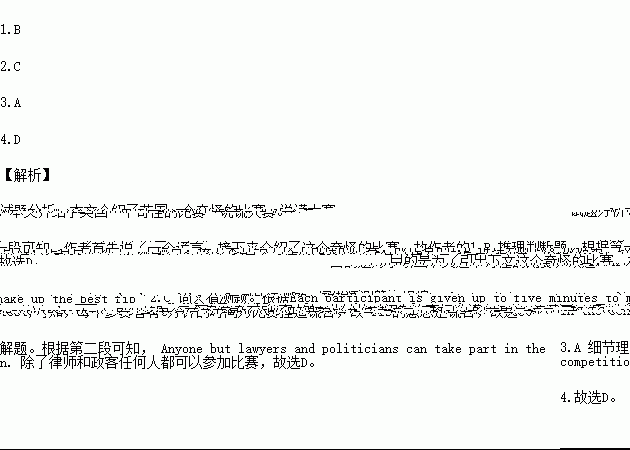题目内容
A terrible competition is going on in England, with billions of dollars and hundreds of lives at risk. OK, that’s not true. But competitors from around the world gathered on Thursday for the annual competition to compete for the world’s biggest person who tells lies.
Each participant is given up to five minutes to make up the best fib in the contest, which was founded in honor of 19th-century Bridge Inn landlord Will Ritson, who was reportedly famous for his lies. Competitors gather at the Bridge Inn every year for the competition, a small pub in northwestern England. Anyone but lawyers and politicians can take part in the competition.
A study found that nearly all lies are detectable (可检测的) through visible facial muscle reactions in the person telling a lie. “Thus, while interpersonal cheat often is highly successful, signs of hidden emotional states are communicated clearly to the informed observer,” the study concluded.
A churchman of Carlisle reportedly holds what may be the greatest lie of all time in the competition, simply stating, “I have never told a lie in my life.”
In 2003, Abrie Krueger from South Africa became the first one to win the competition. In 2006, comedian Sue Perkins became the first female to win the competition, telling a tale about people riding camels to work as a result of climate change.
1.Why does the author tell a lie at the beginning of the passage?
A. He likes telling lies.
B. He intends to talk about a contest.
C. Lies can be detected by someone.
D. Nearly everyone has told lies.
2.What does the underlined word “fib” in Paragraph 2 probably mean?
A. Experience. B. Story. C. Lie. D. Plot.
3.Who can’t take part in the competition?
A. Lawyers & politicians. B. Reporters & editors.
C. Doctors & teachers. D. Students & managers.
4.What’s the author’s main purpose of this passage?
A. To explain how to deal with lies.
B. To invite people to take part in the competition.
C. To discuss how to avoid telling lies.
D. To introduce a strange competition.
短文改错
下面短文中有10 处语言错误。请在有错误的地方增加、删除或修改某个的单词。
增加:在缺词处加一个漏字符号(∧),并在其下面写上该加的词。
删除:把多余的词用斜线(﹨)划掉。
修改:在错的词下划一横线,并在该词下面写上修改后的词。
注意:1.每处错误及其修改均仅限一词;
2.只允许修改10 处,多者(从第11 处起)不计分。
例如:
It was very to get your invitation to spend ^ weekend with you. Luckily I was the am completely free then, so I’ll to say ”yes”. I’ll arrive in Bristol at around 8:00 p.m. in Friday on evening. |
An old man whose eyesight was failing comes to stay in a hotel, a bottle of whisky in his hand. On the wall was a fly he took for a nail.The moment he tried to hang the bottle on it, they fell and broke.When the landlady discovered what had been happened, she decided to do him favor.The next morning when he was out, the hotel worker hammered a nail exact where the “fly” had been.Before the old man came back, the smell of the whisky reminded him the accident.Looking at the spot what he thought the “fly” was again, he was so angry that he slapped it with all his strengths.On hearing the loud cry, the landlady rushed in.To her surprise, the poor old man was sitting on the floor with the palm of his hand bleed.

